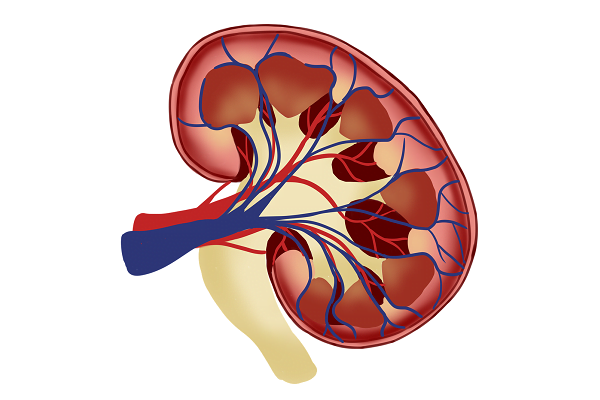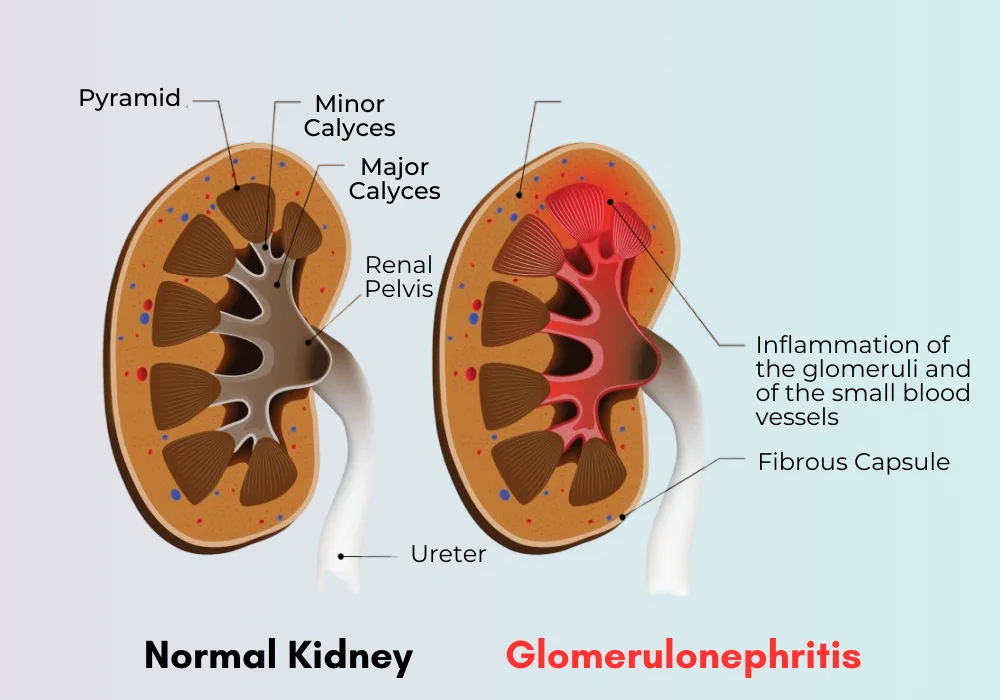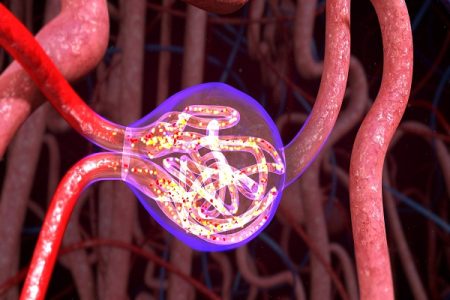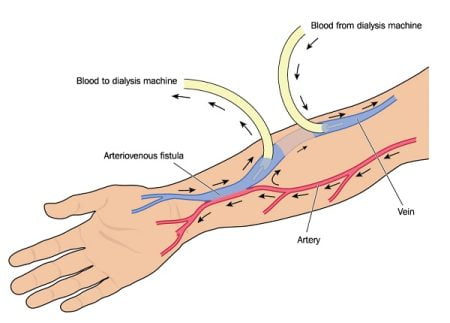Understanding Glomerulonephritis
- Updated on: Aug 3, 2024
- 3 min Read
- Published on Oct 18, 2022

Glomerulonephritis is damage to the tiny filter’s interior of your kidneys (the glomeruli). It often results from your immune machine attacking healthy frame tissue.
Glomerulonephritis does now not normally cause any important signs and symptoms. It’s more likely to be diagnosed when blood or urine checks are completed for every other purpose.
Although moderate cases of glomerulonephritis can be dealt with effectively, for some human beings the condition can cause long-term kidney troubles.
Symptoms of Glomerulonephritis
In intense cases of glomerulonephritis, you may see blood in your urine. However, that is generally observed when a urine sample is tested.
Your urine may be frothy if it consists of a huge amount of protein.
If quite a few proteins leak into your urine, swelling of the legs or different parts of the frame also can develop. This is called nephrotic syndrome.
Depending on your form of glomerulonephritis, different components of your frame can be affected and reason symptoms which include:
- Rashes
- Joint ache
- Respiration troubles
- Tiredness
- Many people with glomerulonephritis also have high blood strain.
If you note blood in your urine this does not always mean you have glomerulonephritis, however, the reason should be investigated.
If they suspect glomerulonephritis, they’ll generally arrange:
A blood take a look at – to measure your creatinine stage
A urine taken a look at – to test for blood or protein in your urine
If you do have glomerulonephritis, in addition, blood checks can be had to assist find out the reason.
If your kidney problem desires to be investigated further, it could be endorsed that you have:
An ultrasound test – that is to check the scale of your kidneys, ensure there are no blockages, and look for some other issues
A biopsy – this is to dispose of a small pattern of kidney tissue, accomplished the usage of nearby anesthetic to numb the area; an ultrasound device locates your kidneys and a small needle is used to take a sample
Causes of Glomerulonephritis
Glomerulonephritis is frequent because of a hassle together with your immune system. Sometimes it is a part of a condition inclusive of systemic lupus erythematosus (SLE) or vasculitis.
In a few instances, it may be caused by infections, inclusive of:
- HIV
- Hepatitis B and hepatitis C
- Infection of the coronary heart valves (endocarditis)
In most cases, glomerulonephritis no longer runs in families.
If you’re diagnosed with an inherited sort of glomerulonephritis, a health practitioner can recommend you approximately the possibility of a person else in your own family being affected.
They may also advocate screening, which may discover those who may be at improved risk of growing the condition.

Treatment of Glomerulonephritis
Treatment for glomerulonephritis depends on the cause and severity of your condition. Mild instances may not require any treatment.
Treatment can be as easy as making adjustments to your weight loss program, including consuming less salt to reduce the strain on your kidneys.
Medicine to lower blood strain, which includes angiotensin-changing enzyme (ACE) inhibitors, is typically prescribed as it facilitates guarding the kidneys.
If the condition is due to a hassle along with your immune system, a medication called immunosuppressant can be used.
Complications of Glomerulonephritis
Although treatment for glomerulonephritis is powerful in lots of instances, further problems can every so often expand.
These encompass:
- Persistent kidney ailments
- High cholesterol
- Blood clots – inclusive of deep vein thrombosis (DVT) or a pulmonary embolism
- Damage to other organs
- Kidney failure
If you are identified with glomerulonephritis, a physician may additionally prescribe a remedy to help decrease your blood strain and lower your cholesterol.
FAQs
What are the common symptoms of glomerulonephritis?
Typical symptoms include blood in urine, proteinuria, swelling, and high blood pressure. Consult a healthcare professional for accurate diagnosis.
Can glomerulonephritis be prevented?
While some cases are preventable, maintaining a healthy lifestyle, managing underlying conditions, and prompt treatment can reduce the risk.
Is glomerulonephritis contagious?
No, it is not contagious. It's often caused by the body's immune response to infections or other diseases.
What treatment options are available for glomerulonephritis?
Treatment may include medications, lifestyle changes, and sometimes, dialysis or kidney transplant in severe cases.
How is glomerulonephritis diagnosed?
Diagnosis involves medical history, physical exams, blood tests, imaging studies, and a kidney biopsy for a precise understanding.












